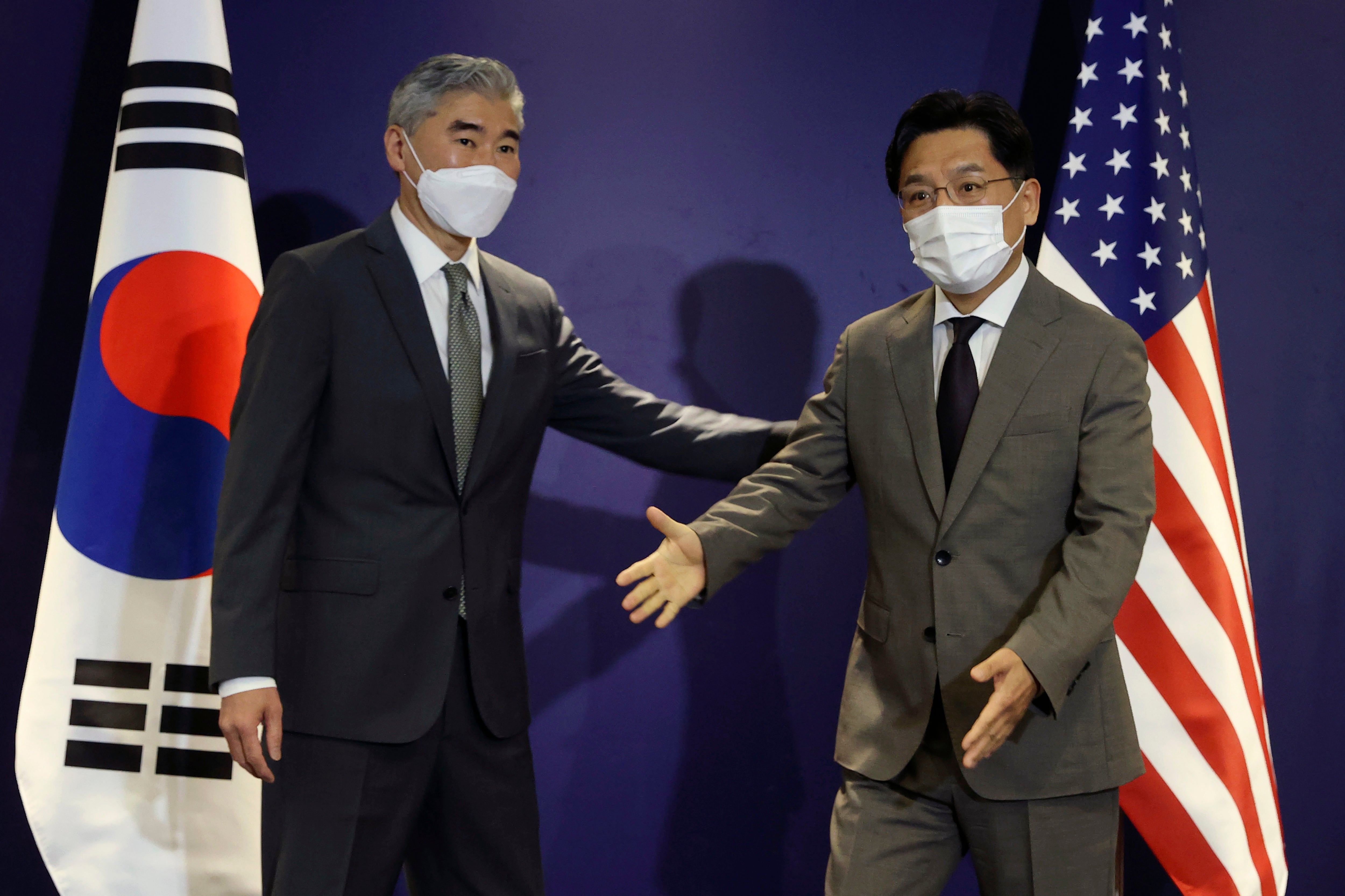Biden's special envoy urges North Korea to return to talks
U.S. President Joe Biden’s special envoy for North Korea has said he's ready to meet his North Korean counterparts “anywhere and at anytime” as he held discussions with South Korean officials over stalled nuclear talks with the North

Your support helps us to tell the story
From reproductive rights to climate change to Big Tech, The Independent is on the ground when the story is developing. Whether it's investigating the financials of Elon Musk's pro-Trump PAC or producing our latest documentary, 'The A Word', which shines a light on the American women fighting for reproductive rights, we know how important it is to parse out the facts from the messaging.
At such a critical moment in US history, we need reporters on the ground. Your donation allows us to keep sending journalists to speak to both sides of the story.
The Independent is trusted by Americans across the entire political spectrum. And unlike many other quality news outlets, we choose not to lock Americans out of our reporting and analysis with paywalls. We believe quality journalism should be available to everyone, paid for by those who can afford it.
Your support makes all the difference.U.S. President Joe Biden’s special envoy for North Korea said Monday he’s ready to meet his North Korean counterparts “anywhere and at anytime” as he held discussions with South Korean officials over stalled nuclear talks with the North.
Sung Kim’s visit to Seoul comes amid declining expectations for a quick resumption of talks and new tensions over ongoing U.S.-South Korean military exercises. North Korea has described the exercises as a rehearsal for an invasion and has threatened unspecified countermeasures that would cause a “security crisis” for the U.S. and South Korea.
After meeting with senior South Korean diplomat Noh Kyu-duk, Kim reiterated that the Biden administration has no hostile intent toward North Korea and that the joint drills are routine and defensive in nature.
Kim and Noh told reporters that they discussed expanding humanitarian assistance to North Korea and other possible ways to facilitate diplomacy. Kim also plans to meet Russian Deputy Foreign Minister Igor Morgulov, who is also visiting Seoul.
“The United States does not have hostile intention for (North Korea). The ongoing combined military exercises are long-standing, routine and purely defensive in nature and support the security of both our countries,” Kim said. “I continue to stand ready to meet with my North Korean counterpart at anywhere and at any time.”
Talks between the United States and North Korea have stalled since the collapse of a summit between former President Donald Trump and North Korean leader Kim Jong Un in 2019, when the Americans rejected the North’s demand for a major easing of economic sanctions in exchange for a partial reduction of its nuclear capabilities.
Kim has since pledged to bolster his country’s nuclear deterrent while urging his people to stay resilient in a struggle for economic self-dependence in the face of U.S. pressure. His government has so far rejected the Biden administration’s overtures for talks, demanding that Washington abandon its “hostile” policies first.
The atmosphere for dialogue deteriorated further this month when Kim's powerful sister released a statement saying the joint drills were the “most vivid expression of the U.S. hostile policy” toward North Korea and that the North will work faster to strengthen its preemptive strike capabilities.
The United States and South Korea are conducting a nine-day joint military exercise that began last Monday which Seoul’s Defense Ministry says is mostly computer-simulated and doesn’t involve live field training. There have been no known missile tests by North Korea since the start of the drills, although South Korean military officials have said the North is currently staging its own summertime exercises.
North Korea has long bristled at U.S.-South Korea military drills and often responds to them with its own weapons demonstrations. The allies in the past few years have canceled or downsized some of their joint training exercises to provide space for diplomacy or because of the COVID-19 pandemic.
Some analysts say North Korea’s recent threat may signal a resumption of its weapons testing. North Korea ended a yearlong pause in ballistic tests in March by firing two short-range missiles into the sea, continuing a tradition of testing new U.S. administrations with weapons demonstrations aimed at measuring Washington’s response and wresting concessions.
There haven’t been any known test launches since then as Kim has focused national efforts on fending off the coronavirus and salvaging a broken economy damaged further by pandemic border closures and food shortages.